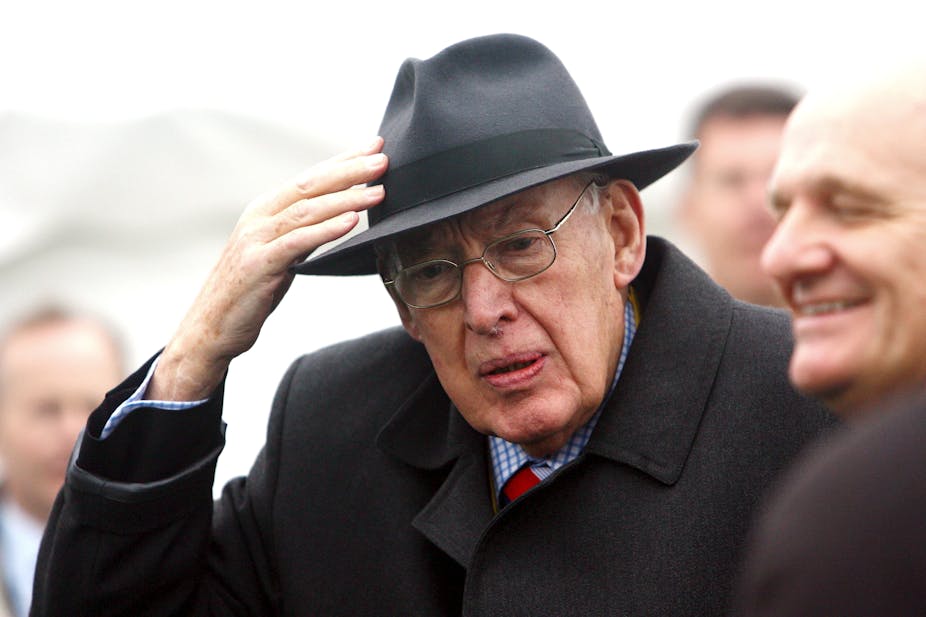Ian Paisley, the firebrand face of Unionism in Northern Ireland for decades, has died at the age of 88. While he won’t be remembered as the Nelson Mandela of Ulster, his important role in the peace process can’t be denied.
The sight of Paisley sharing a joke with Martin McGuiness after agreeing to resume a power sharing government in 2007 quickly became the billboard for a Northern Irish peace process on life support. Here was Paisley, the leader of Ulster Unionism, the man who once vowed to destroy Irish nationalism, cracking gags with a former IRA commander as if they were a comedy double act rather than career enemies.
Fire stoker
Paisley’s transformation from belligerent to peacemaker appeared out of character. This was a man jokingly called “Dr No” by his adversaries for his hard-won reputation of resisting any opportunity of peaceful compromise in Northern Ireland. To many Irish nationalists in Northern Ireland, Paisley was little more than a sectarian bigot driven by a deep hatred for Roman Catholicism. A religious cleric he may have been, but for Catholics he was no man of peace. He was a major leader stoking the fires of communal violence.
This popular image of Paisley explains, in part, his instrumental role in breathing the peace process back into life. Paisley was fuelled by the desire to leave a historical legacy that renovated his tarnished image from extremist to conciliator. He viewed the peace process as an opportunity to secure his lasting legacy as the leader who had simultaneously secured the long-term future of Northern Ireland’s place in the UK and a political compromise between unionists and nationalists.
Paisley’s path to peace, which culminated in 2007 is somewhat indicative of a once reviled outsider who wished to be accepted by the establishment on his own terms. His career had until then been a litany of radical interventions against the political establishment in its numerous efforts to settle the Northern Ireland conflict.
In 1974, as the UK and Irish governments tried to implement a new power-sharing deal to end violence in Northern Ireland, Paisley led thousands onto the street, including paramilitaries, to force an end to the arrangement. Again, in 1985, as the then prime minister Margaret Thatcher sought to hammer out an agreement between the UK and the Republic of Ireland, Paisley addressed 500,000 protestors in Belfast to end all hope of a permanent deal. Even Paisley, however, could not muster enough support to collapse the Good Friday Agreement, the historical peace deal signed in 1998.
Golden moment
But as the power-sharing government fell under the weight of negotiating the decommissioning of IRA weapons, a golden opportunity emerged for Paisley to don the mantle of peacemaker. His party, the hardline, anti-establishment Democratic Unionist Party, defeated the more moderate Ulster Unionists – led by Nobel Peace Prize-winner David Trimble – to become the biggest unionist group. That left Paisley as the only leader with sufficient popular support to lead unionism into new negotiations with nationalists to resurrect the peace process.
A shift in thinking had also taken place among the leaders of the UK, Irish and US governments. While the political establishment had sought to exclude hardliners like Paisley in favour of moderates to foster compromise, leaders such as Tony Blair realised that stability was more likely to occur by accommodating the respective extremists of unionism and nationalism.
The new moderate
Paisley suddenly found himself in the unusual position of being courted by the same political establishment that once treated him as a dangerous pariah. The danger of bringing him in from the cold, though, was that he might bring the cold with him. It was feared his extremist views would only deepen sectarian divisions once he entered government.
But once inside government as first minister, Paisley turned out to be more moderate and accommodating than anticipated. For those that knew him well, this was not completely surprising, even among Irish Catholics. Paisley was long held in esteem as hard-working and impartial by the constituents he represented as an MP, many of whom were Catholics.
His journey from sectarian provocateur to peacemaker may not entirely erase his role in the Northern Irish conflict, but it is a path that merits some thanks.

